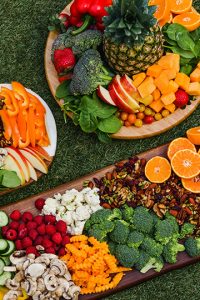 Nutrition tips for runners can be broad enough to include all types of runners from the casual runner to the marathon runner. That’s because good nutrition is universal. However, some nutritional information or specific food or eating suggestions are just for the marathon runner to help him or her overcome the fatigue that can occur near the end of the race, when the glycogen stored in the muscles become depleted. Good training that includes pacing helps, but you also need good nutrition to have your body in peak condition.
Nutrition tips for runners can be broad enough to include all types of runners from the casual runner to the marathon runner. That’s because good nutrition is universal. However, some nutritional information or specific food or eating suggestions are just for the marathon runner to help him or her overcome the fatigue that can occur near the end of the race, when the glycogen stored in the muscles become depleted. Good training that includes pacing helps, but you also need good nutrition to have your body in peak condition.
Body fat slows you down.
You wouldn’t normally think of a marathon runner as having excess body fat, but statistics show that even one extra pound of body fat can cause the runner to add a minute to their times. That means distance runner need to shed the dead weight and be in the low range of acceptable body fat. Eating healthy meals and carefully monitoring your diet will help achieve the distance and time you desire.
Sports drinks may impede your body’s adaptation to muscle glycogen depletion.
Sports drinks have a place in marathon training, just not at every session. Long tough runs lasting longer than two hours require the benefits of the drink, but shorter, less strenuous ones may not. In fact, one recommendation is to drink them only every other workout if the training session is more than an hour but less than two hours and not necessary at all for vigorous runs under an hour or easy runs up to 90 minutes. Having a sports drink available all the time doesn’t allow your body to adapt and become more effective at burning fat. Muscle glycogen depletion is necessary for that to happen.
Add fat loading before a race in addition to carbo loading.
A high fat, low carbohydrate diet isn’t good for training, but high fat before the pre-race carbo loading can be beneficial. Two weeks before a race, start a diet that provides 65 percent of the calories from fat for ten days, then switch to a high carbohydrate diet for the remaining three days before the race. This short-term high fat diet can help your body improve the fat burning ability and the carbo loading improves the muscle glycogen reserves. This type of diet was tested by Vicki Lambert on the endurance of long distance cyclists and found it improved their performance dramatically compared to a traditional diet followed by carbo loading. Make sure the fat you choose is healthy fat from avocados, salmon, nuts, cheese and eggs for example.
- Try beet juice instead of water when you train. You might find it’s an excellent drink to keep you hydrated and improve your performance. Studies show that drinking a half liter a few hours before the marathon helps.
- Stay hydrated but don’t force yourself to drink a specific amount. Drinking as you become thirsty is the best method.
- Try switching out foods to seek healthier choices. Consider kefir instead of yogurt for a probiotic choice or matcha instead of green tea. Teff is a great gluten free alternative.
- Steer clear of sugars, alcohol and avoid making any dietary changes the day of the race. That’s not the time to experiment with new ideas.
For more information, contact us today at The Running Warrior
